
Dealing roulette looks simple enough from the perspective of anyone who has casually played the game.
Yet, looks can be deceiving; being a roulette croupier combines deep game knowledge, attention to detail, strong people skills, and even some math!
Regardless of whether you’re curious about the craft of dealing roulette or are considering starting a career in the casino industry; I, Heather Ferris, will give you the ins and outs on how to deal roulette in any setting.
Roulette Dealing Best Practices
Dealing roulette is very different from playing roulette, as players rarely have to pay attention to things like cheaters or injury.
Below are the key aspects you should know about roulette from an expert casino dealer perspective:
Roulette Table & House Edge

The Roulette layout has 36 numbers, half of them red and half of them black. If you add all the numbers in the table together, it’ll equal 666.
Depending on the table, the layout can have one, two, or three zeros—which greatly impacts the odds of winning for both the house and the players.
The House Edge for a table with only one zero is 2.7%; with two zeros, it goes up to 5.26%, and with three zeros, it increases to 7.69%.
Remember that the lower the house edge is, the better for the player.
Case the Layout to Prevent Cheating
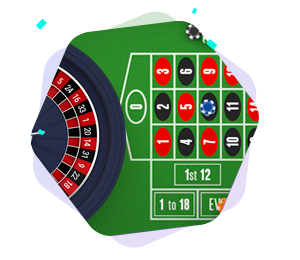
Casing the layout means that the roulette dealer visually ensures that all bets are positioned correctly and that there are no bets over or under the table limits.
This way, no bets can be misinterpreted, and you verify that no high-value cheques are placed in the betting area.
The Columns and the 3rd Dozen are the most vulnerable sections of the table and should be watched more closely because of it.
You should also note which bets are placed where and how much is there, as this will help you in the future if someone tries to pinch or past-post their bet.
Stay Aware of Pinching and Past Posting
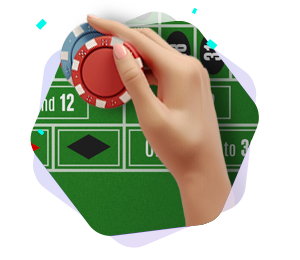
Pinching is when a player takes money off their bet, while past posting is when a player adds more money to their wager.
Pinching and past posting typically happen after the outcome has been determined, and the cheater can either cut his losses or increase his wins.
Past posting originates from horse racing, where a sound indicates a “call to post,” meaning no more bets can be taken.
Any bets made after or past this time are considered past posts.
Spin the Roulette Ball the Right Way
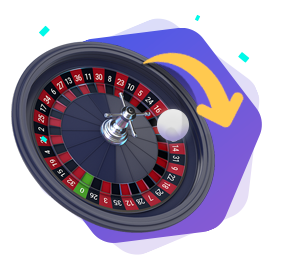
As counter-intuitive as this might sound, roulette dealers should not look at the wheel when they spin the ball.
The wheel should be spinning at a reasonable speed, not so fast that it’s difficult to read the numbers as they pass.
The ball must go around the wheel a minimum of 3 times for it to qualify as a valid spin.
A second or two before the ball drops, the dealer will wave their hand over the table and announce, “No more bets.”
The dealer will take a step back to see the wheel and the layout simultaneously, ensuring no one bets are placed after the call.
What Happens If The Ball Flies Off the Roulette Wheel?
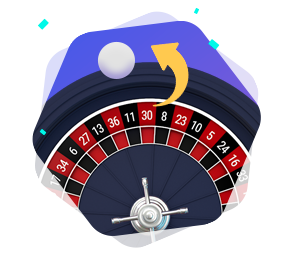
If the ball flies out of the wheel in a casino setting, the floor supervisor must inspect it before it can go back into play.
Both in pro and casual environments, that spin is considered void, and the dealer will spin the ball again.
When spinning the ball, the dealer will snap their fingers while keeping their wrist straight.
Prevent This Common Roulette Dealer Injury

Try not to fling the ball, as this can cause a cyst to grow in the wrist. These cysts are painful and will need surgery to be taken out.
If the dealer snaps the ball incorrectly, over and over again, they will either get a cyst in their wrist or their finger.
That is why it’s important to spin the ball correctly when snapping it.
Sometimes, the ball will fly out of the wheel. There is no need to be embarrassed, as this is normal and happens to the best of us.
The more the dealer practices, the less this will happen.
Stay Square with the Roulette Game
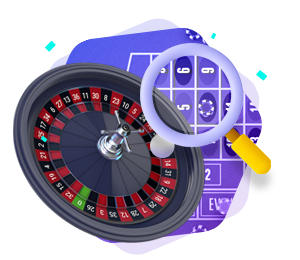
As the ball drops, the roulette dealer must look at the wheel without taking their eyes off the layout.
To do this, you should take several steps back to simultaneously see the wheel and table, as this will make it easier to spot Past Posters.
Roulette dealers should never have any part of the table blocked from view nor turn their back on the game.
On a right-handed table, when paying the player, the dealer will deliver the roulette chips with their left hand so that the dealer’s head is never completely turned away from the layout or the bankroll.
In addition, the roulette dealer should always keep an eye on the bankroll when using both hands to pay the player.
Similarly, on a left-handed table, the dealer will deliver the roulette chips with their right hand when paying the player.
Take-and-Pay: Detailed Roulette Payout Procedure
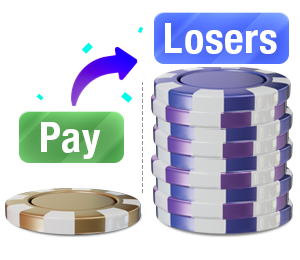
When completing the Take-and-Pay procedure, the roulette dealer will take the dolly, or the marker, and mark the number that won.
The dealer will carefully identify the winning wagers and carefully move all of the losing wagers away, pushing them into a pile and pulling them toward the mucking area.
There, the bets will be mucked or picked up and put in a stack of 20 after all winning wagers have been paid.
When the dealer pays a winning bet, they go from the outside in and from top to bottom.
Outside bets are located outside the numbers and consist of the Columns and the Dozens, which pay 2 to 1, and the Red/Black, Odd/Even, 1-18, and 19-36 bets, which all pay Even Money.
Types of Roulette Bets
There are two main types of bets within the game of roulette: inside and outside bets. These names refer to where each type of bet is located within the roulette table.
Below is a list of the most common roulette bets and their payouts.
Inside Bets
Inside bets are associated with the numbers, and the payout amount corresponds with the chip’s location inside the table.
- Straight-up: a chip placed on a single number pays 35:1.
- Split: a chip covering two numbers pays 17:1.
- Street: a chip placed on a number and one of the dozens, it pays 11:1.
- Corner: a chip placed on a corner covering the four numbers it touches pays 8:1.
- Top Line, or Basket: When a chip is on the corner of a zero and a three, covering five numbers (the single zero, the double zero, one, two, and three), it pays 6:1.
- Double Street: A chip straddling two Streets, covering six numbers, pays 5:1.
Outside Bets
Outside bets typically cover a range of numbers, and the roulette payouts are much smaller in this type of bet.
- High or Low: Betting on the top or bottom half of the roulette wheel pays 1:1.
- Red or Black: Betting the ball lands on either black or red pays 1:1.
- Odd or Even: Betting that the outcome will be an odd or even number pays 1:1.
- Dozens Bet: Wagering that the ball will land on the 1st, 2nd, or 3rd dozen of the wheel pays 2:1.
- Column Bet: Three groups of 12 numbers are arranged into columns that players can bet on paying 2:1.
- Snake Bet: Not all casinos offer this bet that pays 2:1.
Ensuring Roulette Game Security and Table Protection
Table protection is a cat-and-mouse game that roulette dealers must play on top of dealing and paying out wagers.
The only way to win is for the dealer to improve their dealing skills. Learn as much as possible, grow, evolve, and level up to make catching cheaters and scammers with their ever-changing yet creative schemes easier.
Cheats will commonly survey casinos to check the competency level of the staff. This is called “Shopping the Store”.
The objective of the casino manager should be to train their staff to avoid being a proper target. Nobody wants a reputation of being easy to hit.
Playing Roulette at Home
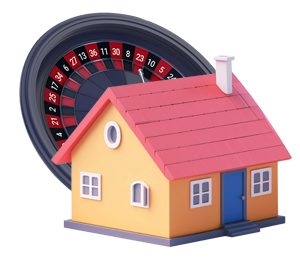
The prospect of being a home roulette dealer is a bit more challenging than other table games like blackjack, poker, or craps, which require far simpler resources than purchasing a roulette table and wheel.
Getting a quality set can set you back a couple of hundred dollars; on top of that, someone will need to be able to bankroll 35x payouts in case someone hits a single number on game nights.
Despite the financial demands, home roulette dealers shouldn’t feel discouraged.
You can always buy second-hand equipment online and be creative about how you and your friends handle bets and jackpots.
Remember that you aim to have fun and not run a highly profitable business.
Roulette Payout Tricks
As a roulette dealer, you’ll face the unique challenge of quickly calculating and memorizing complex mathematical operations when handling payouts. Fortunately, croupiers have developed some tricks to help them handle payouts on time.
- Learn the Shortcut for 35:1 Straight Bets
Multiplying any number by 35 is tricky. Luckily, you can divide the stake in half, multiply by seven, and finally add a 0. Example: 8/2=4, 4×7=28, then add a zero at the end to get 280 - Memorize the 1-10×17 Table
Splits bet pay 17:1. So, you should memorize the multiplication table from 1 to 10 multiplied by 17. Knowing this by memory lets you easily calculate the payout for over 10 splits by doubling the corresponding number. Memorizing 17×17=289 is also handy. - Become Familiar with Picture Bets
This trick is learned with formal roulette dealer training but is still worth mentioning. Expert croupiers can quickly calculate the payout for a given player by taking notice of patterns on the table, doing something called picture bets.
Other Important Skills for the Roulette Dealer Role
As mentioned earlier, a good roulette dealer isn’t only measured by how they can hand out payouts or prevent cheating but by the overall experience they can deliver to patrons.
Communication Skills
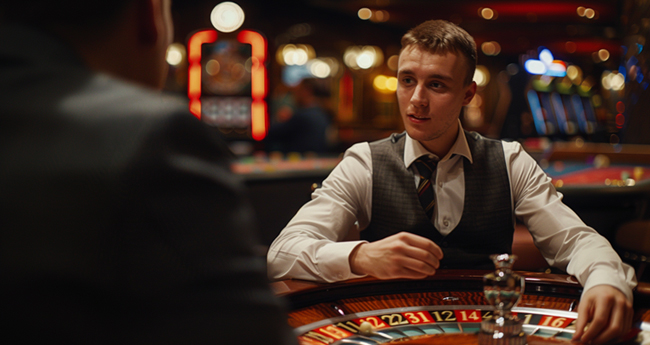
Casino professionals like roulette and blackjack dealers face all kinds of players and situations on the field.
You’ll need to handle everything professionally, from explaining the game basics to first-time players to clarifying certain rules or techniques and making your team aware of any unexpected situation where the casino needs to intervene.
Interpersonal Skills and Roulette Etiquette

Working on a casino floor is also dealing with the wide range of emotions that come with gambling.
Joy, frustration, sadness, and more will be present at your table, and you must keep good roulette etiquette regardless of what the shift throws at you.
Master Roulette By Playing Online
Online Roulette
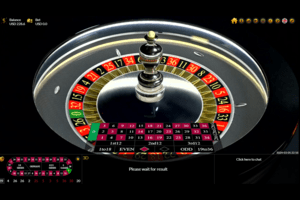
You can master roulette odds and payouts, as well as the game’s mechanics, by playing simply it. Between land-based and online options, online roulette play is more efficient regarding time and money.
Online casinos can be accessed from anywhere with an internet connection; below are some of my favorite online roulette games.
Play Roulette Online for Free
Free play will allow you to learn from countless spins without risking a single dime. You can start playing European Roulette, a variant with a good house edge.
Professional Roulette Dealer Training
There are multiple methods to deepen your knowledge beyond playing roulette online, including reading books and instruction manuals on roulette, attending training seminars, browsing internet guides, joining forums, studying surveillance videotapes, communicating with more experienced executives, and learning new games.
Ultimately, if you want to pursue a career as a roulette dealer, you’ll need to polish your resume and apply for a job at a casino. They’ll train you in one of their apprenticeship programs if they see your potential.
Remember that dealing roulette involves more than calculating payouts, so you’ll have to level up your people’s skills and your multitasking and spatial awareness abilities.




